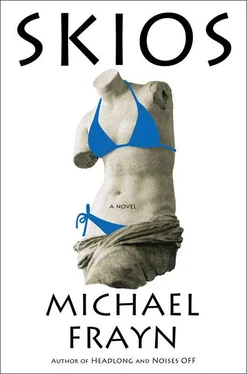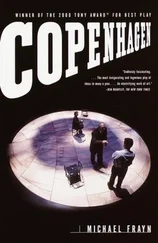“I just want to say a big thank-you to our distinguished guest,” said Nikki Hook, “for making this evening such a fascinating and wonderful occasion, and one that I’m sure none of us here will ever forget…”
She stopped and read the sentence aloud again to herself, then deleted “fascinating and wonderful” and inserted “unique and special,” which sounded a little bit more — well — unique and special. A little bit more Mrs. Fred Toppler, in fact, which was what counted, because it was after all Mrs. Fred Toppler, not Nikki, who was going to be so grateful, and find it all so extraordinary. Nikki was merely Mrs. Fred Toppler’s PA. She provided the thoughts for Mrs. Toppler to think, but in the end it was Mrs. Toppler who had to think them.
Outside the windows of Nikki’s office the tumbling gardens and hillsides of the Fred Toppler Foundation were vivid in the blaze of the Mediterranean afternoon. Cascades of well-watered bougainvillea and plumbago challenged the saturated blue of the sky. The fishermen’s cottages along the waterfront and the caïques rocking at anchor on the dazzle of the sea were as blinding white and as heavenly blue as the Greek flag stirring lethargically on the flagpole.
Nikki, though, looking out at it all as she composed Mrs. Toppler’s thoughts for her, was as discreetly cool as the air-conditioning. Her discreetly blonded hair was unruffled, her white shirt and blue skirt a discreet echo of the Greek whites and blues outside, her expression pleasantly but discreetly open to the world. She was discreetly British, because Mrs. Toppler, who was American, like the late Mr. Fred, appreciated it. Europeans in general embodied for her the civilized values that the Fred Toppler Foundation existed to promote, and the British were Europeans who had the tact and good sense to speak English. Anyway, everyone liked Nikki, though, not just Mrs. Toppler. She was so nice! She had been a really nice girl already when she was three. She had still been one when she was seventeen, at an age when niceness was a much rarer achievement, and she remained one nearly twenty years later. Discreetly tanned, discreetly blond, discreetly effective, and discreetly nice.
As Nikki watched, people began to emerge from the fishermen’s cottages and drift towards the tables scattered in the shade of the great plane tree on the central square. They were not fishermen; they were not even Greek. They were not tourists or holidaymakers. They were the English-speaking guests of the foundation’s annual Great European House Party. They had spent the day in seminars studying Minoan cooking and early Christian meditation techniques, in classes watching demonstrations of traditional Macedonian dancing and late medieval flower arrangement. They had interspersed their labors with swims and siestas, with civilized conversation over breakfast and midmorning coffee, over prelunch drinks, lunch, and postlunch coffee, over afternoon tea and snacks. Now they were moving towards further spiritual refreshment over dinner and various pre- and postdinner drinks.
Tomorrow evening all this civilization would reach its climax in a champagne reception and formal dinner, at the end of which the guests would be spiritually prepared for the most important event of the House Party, the Fred Toppler Lecture. The lecture was one of the highlights of the Greek cultural calendar. The residents would be joined by important visitors from Athens, ferried out to the island by air and sea. There would be articles in the papers attacking the choice of subject and speaker, and lamenting the sad decline in its quality.
Please God it wasn’t going to be too awful this year, prayed Nikki. All lectures, however unique and special, were of course awful, but some were more awful than others. There had to be a lecture. Why? Because there always had been one. There had been a Fred Toppler Lecture every year since the foundation had existed. They had had lectures on the Crisis in this and the Challenge of that. They had had an Enigma of, a Whither? and a Why? three Prospects for and two Reconsiderations of. As the director of the foundation had become more eccentric and reclusive, so had his choices of lecturer become more idiosyncratic. The Post-syncretistic Approach to whatever it was the previous year had caused even Mrs. Toppler, who was prepared to thank almost anybody for almost anything, to choke on the task, which was perhaps the unconscious reason she had left the “not” out of this being an occasion they would not forget in a hurry. Nikki had seized the chance of the director’s absence on a retreat in Nepal to choose this year’s lecturer herself.
“Dr. Norman Wilfred needs no introduction,” Mrs. Fred Toppler would be saying tomorrow when she introduced him. Nikki looked at the unneeded introduction that followed, paraphrased from the CV that Dr. Wilfred’s personal assistant had sent her. His list of publications and appointments, of fellowships and awards, was mind-numbing. Lucinda Knowles, Nikki’s counterpart at the J. G. Fledge Institute, had assured her that Dr. Wilfred was both a serious expert in the management of science and a genuine celebrity. Her friend Jane Gee, at the Cartagena Festival, said he was the lecturer everybody currently wanted.
So this year—“Innovation and Governance: The Promise of Scientometrics.” There was something about the word “promise” that made Nikki’s heart suddenly sink. Her choice was going to be just as awful as all the others. Even now he was five miles up in the sky, on his way from London, above Switzerland or northern Italy. She had a clear and discouraging picture of him as he sat there in business class sipping his complimentary champagne. All those committees and international lectures would have taken their toll. His jowls would be heavy with importance, his waistline thick and his hair thin with it. He would have dragged “Innovation and Governance” around the world, from Toronto to Tokyo, from Oslo to Oswego, until the typescript was yellow from the Alpine sun, tear-stained from the tropical rains, and exhausted from repetition.
She printed up the unnecessary introduction and the big thank-you, the solid bookends that bracketed whatever was to come. Too late now to alter what that was going to be. It was coming towards them all at 500 mph.
She looked at her watch. She had just the right amount of time in hand to deliver the texts to Mrs. Toppler and then double-check a few things on her list, before she left for the airport. She stepped out of the door of her office into the great brick wall of late-afternoon heat.
Why does one do it? thought Dr. Norman Wilfred as he sipped his complimentary business-class champagne and gazed absently down upon the world five miles below. Why does one do it?
Round and round the same treadmill one went. Another view like all the others over some unidentifiable part of the earth’s surface five miles beyond one’s grasp. Then another airport, and another waiting car. Another eager assurance that everyone was so excited at the prospect of one’s visit. Another guest room with two towels and a bar of soap laid out on the bed. The Fred Toppler Foundation, it was true, had a reputation in academic circles for treating its visiting lecturers well. He foresaw drinkable wine and comfortable chairs set out in soft sunshine or warm shade. All the same, when he thought of all the performance he would have to go through to earn these small compensations, he felt a familiar weariness in the marrow of his bones.
“Dr. Norman Wilfred?” people would say when introductions were made, and he could already see the way the expressions on their faces would change. He could feel the way he would smile and incline his head slightly in return. Once again he would bring out the topics he kept ready for the obligatory mingling with his fellow guests. Once again he would lay out his little stock of unusual knowledge, original thoughts, and interesting opinions. He would offer the scraps of gossip he had brought. He would tell the tried and tested stories.
Читать дальше












